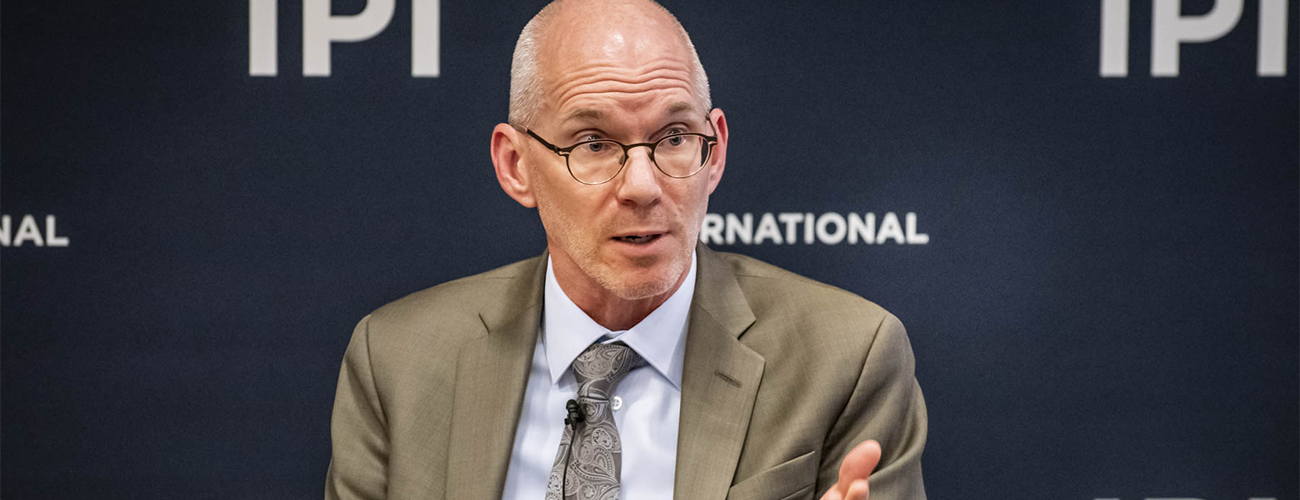“It has become a common refrain in recent months that 2020 is a critical year for Somalia, that 2020 is to be the year of delivery, the year of achievement, and we absolutely subscribe to that analysis,” said James Swan, the Special Representative of the Secretary-General (SRSG) for Somalia and Head of the United Nations Assistance Mission in Somalia (UNSOM). “I should stress that it is not one driven by international partners, it is fundamentally the position of the Somali government that 2020 requires that we address a critical set of priorities together.”
Illustrative of just how epochal this year could be for Somalia, he said, is the planning underway for direct elections by the end of the year which would be the first universal suffrage elections there in 50 years. What has filled the political void in Somalia in the decades since the last such election in 1969 were dictatorships, civil war, and relentless terror attacks.
Speaking at a February 25th IPI discussion of Somalia’s recent progress and immediate future, Mr. Swan said that the priorities of how to restore representative government to the country significantly had been established by the Somalis themselves through a set of roadmaps developed in 2018 and 2019 to produce a “mutual accountability framework” in which the country’s international partners committed themselves to support progress in four key areas. He listed those areas as inclusive politics, security and justice, economic reforms, and social development.
On inclusive politics, Mr. Swan explained that the elections that will take place by the end of the year are being organized on a hybrid model that blends the traditional clan-based affiliations of candidates with a new direct vote procedure replacing the traditional process of selection by elders. There also is a stated commitment to 30 percent representation by women in the parliament though that language didn’t make it into the formal electoral code. Even so, Mr. Swan said, Somalis on their own had already reached 24 percent representation in some comparable political bodies. To gain the necessary popular backing for the new electoral approach, the pace of change was deliberately gradual, he explained. “The end goal is a system that moves beyond the sub clan system, but for now it was too great a leap.”
On security and justice, he acknowledged that the militant Islamist group al-Shabab retains the ability to conduct “shocking terrorist attacks” in Mogadishu and elsewhere in the country but said that the Somali government had faced the security sector gaps identified in a key 2017 report “honestly and squarely and made substantive reforms.” One result of that he cited was that Somali forces joined by troops from the African Union Mission in Somalia (AMISOM) had succeeded in retaking captured towns.
As progress on the economy, Mr. Swan pointed to the government’s having opened the door for clearance of $5 billion of long standing national debt. “Two years ago, this would have been ridiculed as unlikely, but this is an outstanding achievement for the government and federal member states in collaborating to move a dossier forward,” he said. On social development, he said the government had adopted and disseminated a development plan that is in line with the UN Sustainable Development Goals (SDGs) and which “is the basis around which donor partners have agreed to align their support going forward.”
Somalia continues to be in “dire” need of humanitarian assistance and support, he observed, noting that over the past year there had been 30 humanitarian crises, including both droughts and floods. “Last year, $1 billion was needed, and 2020 will likely be the same.”
Mr. Swan described the achievements in the four areas as “substantial progress” but said that turning this into “durable” progress still required broader political consensus in the country. “Consensus is needed not just between the government and the member states, but also with other parties of opposition and civil society,” he said. “These are the priorities of the Somali government. We as international partners being supported by the UN are seeking to advance these priorities in any way we can, but there is only so much that can be done at the technical level in the absence of urgently needed political consensus.”
Karen Pierce, the Permanent Representative of the United Kingdom, the “penholder” country on the Security Council that leads the work of the Council on Somalia and AMISOM, hailed the progress the country had made but expressed a similar concern about the critical importance of building up consensus. “We would say that the central factor in whether these things will be a success is the critical ability of the federal government and states’ governments to work together in power sharing, resource sharing, and working together towards a stronger and more secure Somalia,” she asserted.
Jake Sherman, director of IPI’s Brian Urquhart Center for Peace Operations, noted that UNSOM was one of the first missions to have an explicit mandate to account for climate change and asked how that affected its actions.
“Because of the humanitarian impact including displacement and conflict, it is an element that we need to take into consideration in our activities,” Mr. Swan said. “It’s still being considered through a humanitarian lens, but it will increasingly have an impact on security concerns. Frankly the cycles appear to be accelerating and deepening, and it’s going to be difficult to sustain the same level of humanitarian focus year after year. It can’t just be about an annual response to a humanitarian crisis, but a long term focus on the development, humanitarian, security nexus.”
Mr. Sherman moderated the discussion.








